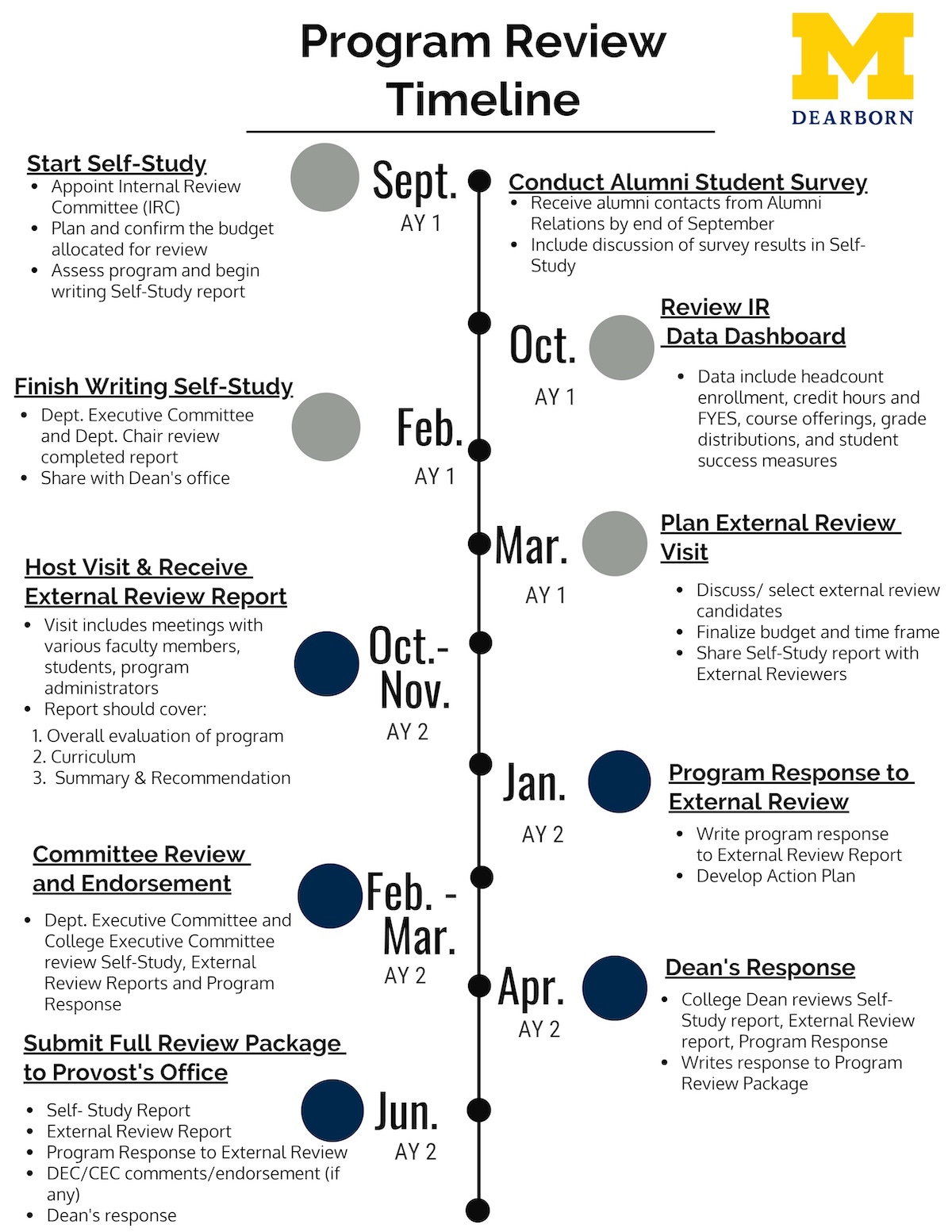Academic Program Review - Undergraduate and Graduate
In fall 2015, the Council of Deans approved campus-wide Academic Program Review Guidelines with the shared goal of unifying and streamlining the process, which aligns with our goals for excellence in teaching, learning, and scholarship.
For details about the program review cycle for each degree and certificate please click on the All Programs - Program Review Schedules button:
Getting Started
Academic Program Review Guidelines
- Details, timelines, and templates for completing your self-study
In order to access the data you will be guided to collect for the academic review process please follow these steps:
Step 1: Request access to the Academic Program Review Dashboard using the WebFOCUS Access Request form (you will be directed to FERPA and Data Use training in MyLinc)
Step 2: Once access has been granted you will be able to access the Academic Program Review Dashboard
- This dashboard includes an Enrolled Fall Student Profile (Gender, Race, Student Type, Class Level), Program Productivity, Grade Distribution, Completions, Retention and Graduation Rates (UG), and Retention and Graduation Rates (GR); that can be examined by program, subject, college, etc.
Step 3: There is other data available via the IRE Webpage such as making a data request or accessing the WebFOCUS enterprise reporting tool,Tableau Dashboards, and various published IPEDS data, the Common Data Set, and NSSE survey data
Supporting Resources
Explore the following resources, best practices, and workshop materials available to support programs through the program review process.
- Best Practices for Successful Self-Study Process -- University of North Carolina, Chapel Hill
- Practices and Strategies for External Reviews -- Susan Everett, University of Michigan- Dearborn, CEHHS
- Approaching the Self-Study as a Project Manager -- Marie Waung, University of Michigan- Dearborn, CASL
- Graduate Program Assessment -- Brahim Medjahed University of Michigan- Dearborn, CECS
- Opportunities, Challenges, and Strategies for Interdisciplinary Programs - Suzanne Bergeron, University of Michigan- Dearborn, CASL
A program review self-study should include an alumni survey of program graduates. By the end of September of a program's self-study year, the program will receive an Excel file of alumni contact data from the Office of Alumni Engagement. Please see the links below for information and tips on conducting an alumni survey.
- The purpose of program review is to conduct a comprehensive study of the program and use evidence to guide program improvement. Program review is informed by regular program assessment activities which investigate students' achievement of program learning goals and prompt Closing the Loop improvements. Visit the Hub's Assessment and Closing the Loop page for strategies and examples of activities around campus.
- Discipline's Response to External Review: External Reviewers are brought to campus during Year 2 of the Program Review process. Reviewers provide thoughts and feedback on curriculum, structure, and the program overall. Disciplines have a chance to respond to the reviewer's reports to correct any factual misinformation and react to comments. As a part of the response, Disciplines should craft an Action Plan (see next bullet point).
- Action Plans outline a program's initiatives moving forward after a program review and should be based on findings and recommendations made in the program's Self-Study, External Review report, and response from the Dean. Action Plans should be submitted by the end of the semester following submitting the program review.
Each fall, Academic Affairs hosts a workshop to help inform and support faculty conducting program reviews.
Suggested Program Review Timeline

Questions about program reviews?
For questions about the program review process and the review calendar, please contact:
Jessica LaGrange
Director of Academic Success
jessbl@umich.edu
